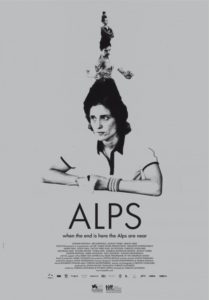Greece’s Yorgos Lanthimos explores absurdity and horror in living the lives of others, boldly deconstructing our personal narratives.
[stextbox id=”grey” caption=”Alps (2011)” float=”true” align=”right” width=”200″]
Director: Yorgos Lanthimos
Writer(s): Yorgos Lanthimos, Efthimis Filippou
Runtime: 93 minutes
Starring: Aggeliki Papoulia, Aris Servetalis, Johnny Vekris, Ariane Labed
Festival: Sydney Film Festival 2012
Distributor: TBA
Country: Greece
Rating (?): Highly Recommended (★★★★)
[/stextbox]
Following Yorgos Lanthimos’ Dogtooth, and last year’s Attenberg which he produced and starred in for Athina Rachel Tsangari, Alps is every bit as magnetic and offbeat as its predecessors. Using the similar absurdist emotional distance that Lanthimos has previously constructed to keep his audience at arm’s length, he carves out a story about the intimate act of entering a grieving family’s life and attempting to substitute for the recently deceased. It doesn’t provide audiences with any easy answers, but is nevertheless a fascinating deconstructive narrative of the multiple lives we all live.
Paramedic ‘Mont Blanc’ (Aris Servetalis) leads a group he refers to as ALPS, who find grieving families through a local nurse (Aggeliki Papoulia) and offer their services as “stand ins” for their loved ones. Other members include a young gymnast (Ariane Labed) and her cruel coach (Johnny Vekris), who doesn’t tolerate any departure from the rules. The acceptance of the women’s downtrodden functions within the group is just part of the leap audiences will have to make, as are the families who willingly allow strangers to enter their houses as substitutes. When the nurse takes on a job outside the group, her own grip on reality begins to slip, and the punishment from within the group is brutal.
If Dogtooth explored the eccentricities of those completely cut off from the rest of society, Alps focuses on a group who are far too closely involved in the lives of others. The members of ALPS give stilted performances in the field, in broken English or monotone Greek, a running gag that is indicative of the insincerity or at least ambiguous motives of the group, which is never explained or explored. More broadly, Alps is a commentary on the familiar notion of post-modern identity, one where we all play our parts, and alter our personalities to suit those around us. As the nurse begins to come undone, it is her need to be a part of something more than herself that becomes the focus. For this, she is reprimanded physically in one of the film’s more confronting scenes, and this reaction is one of the true pieces of emotion on display.
Coupled with absurdity, including bookends set to Orff’s “Carmina Burana” and an elctro-pop remix of the 1960s hit “Popcorn”, Alps might also be seen as a commentary on a ‘buy anything’ culture, one where families can be rented for funerals and weddings, and relationships are formed in the digital morass. In the face of these weighty themes, we often have little choice but to laugh, before recoiling in horror at the consequences of that flippancy. Lanthimos’ bare photography leaves the film’s emotional core open to interpretation, but he may simply be pointing out the craziness of the world we live in.
Alps played at the Sydney Film Festival in June 2012.






